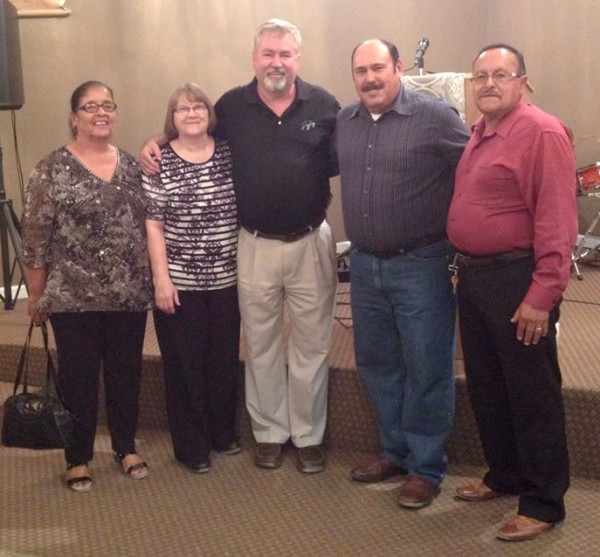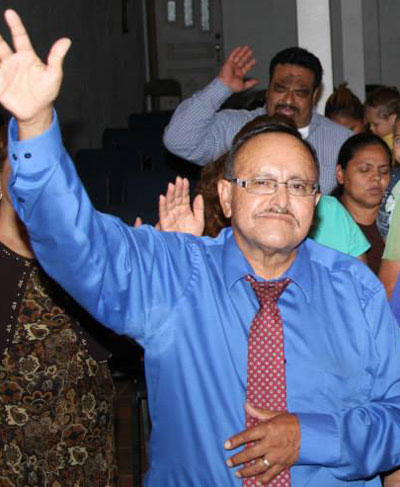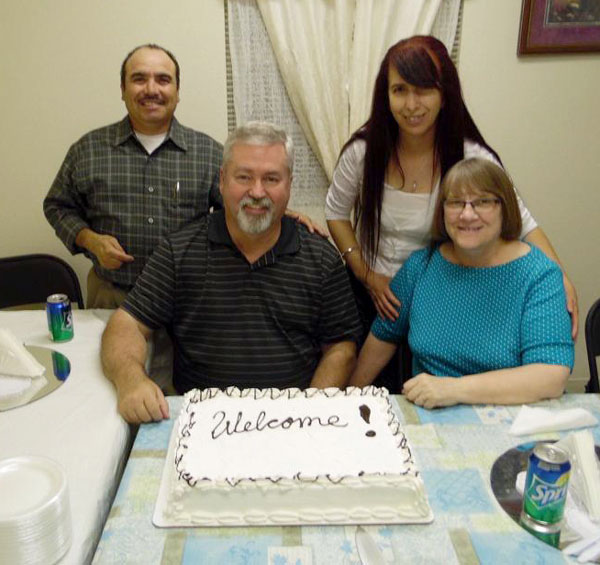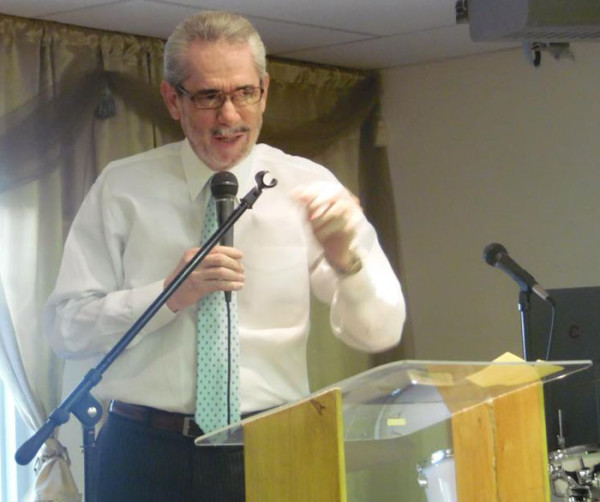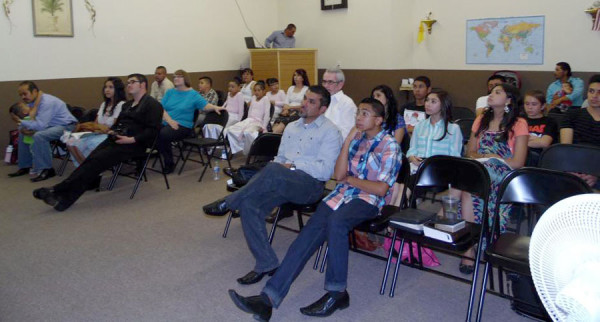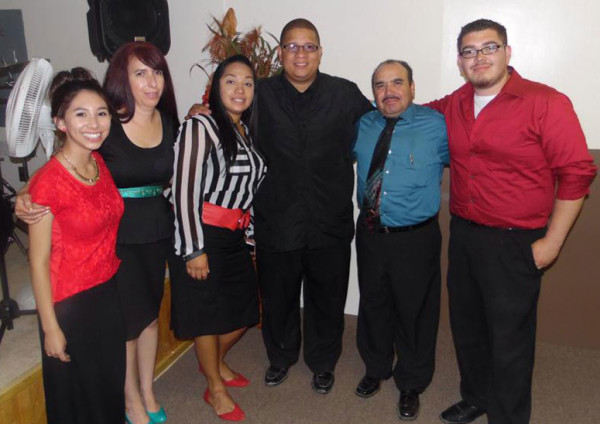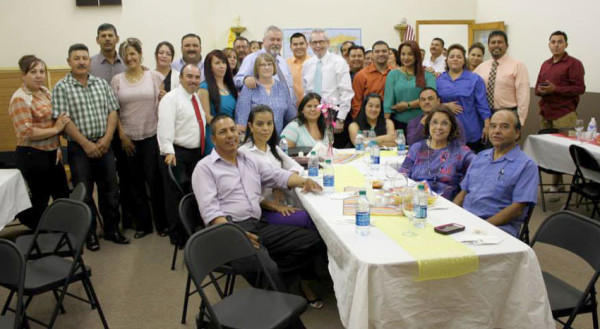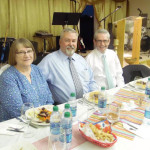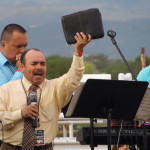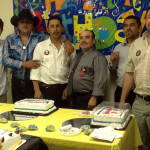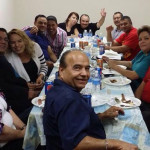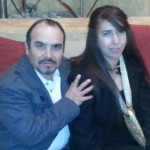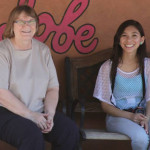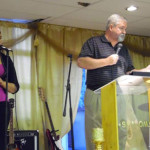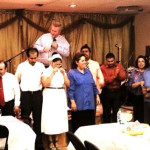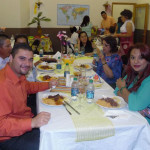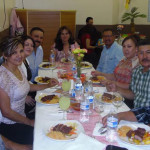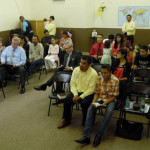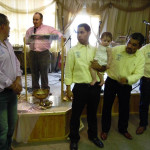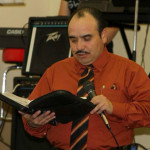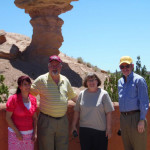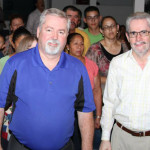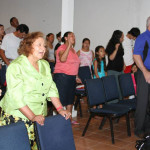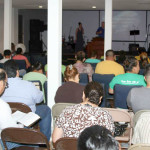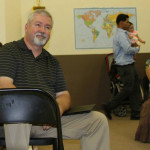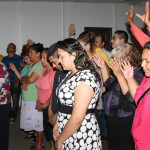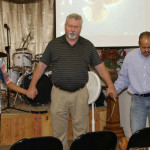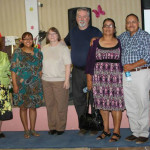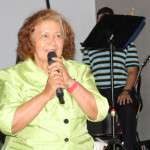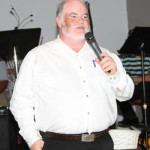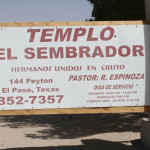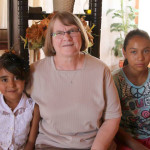August 3, 2014
|
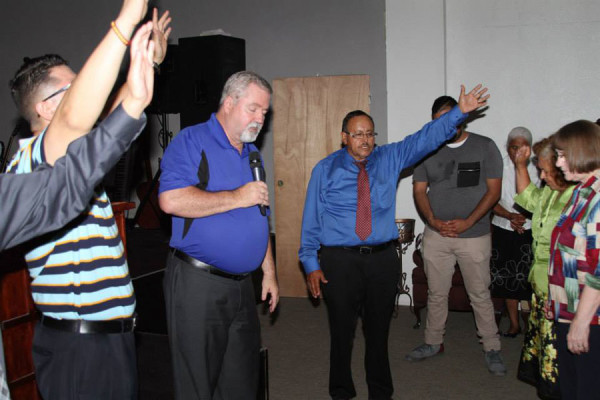
Bishop Phil Whipple (with microphone) closing the Wednesday night service at the El Sembrador church in El Paso. On his left is the church’s pastor, Rev. Robert Espinoza. (click to enlarge)
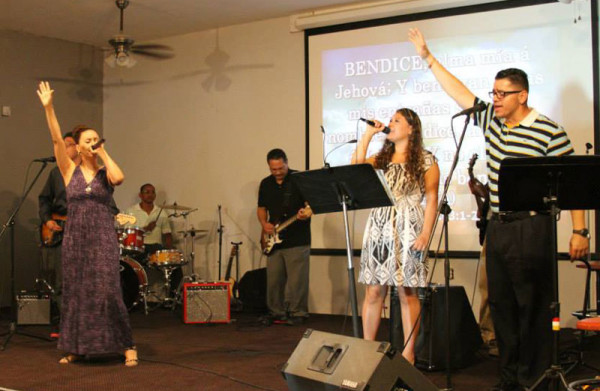
The worship team at El Sembrador.
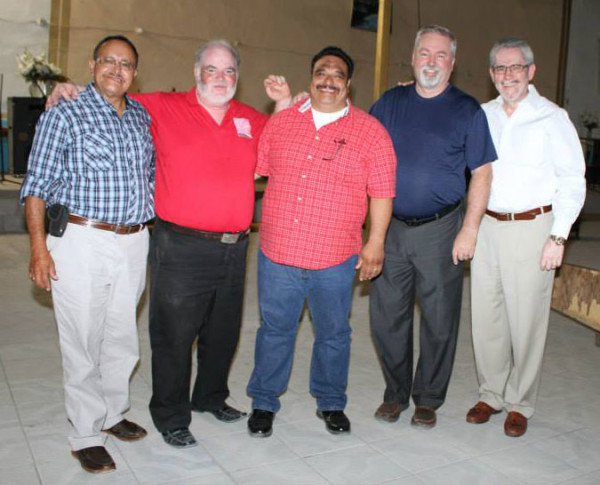
L-r: Robert Espinoza, Carlos Chavez (a UB pastor in Juarez, Mexico), a layperson, Bishop Phil Whipple, Bishop Denis Casco.
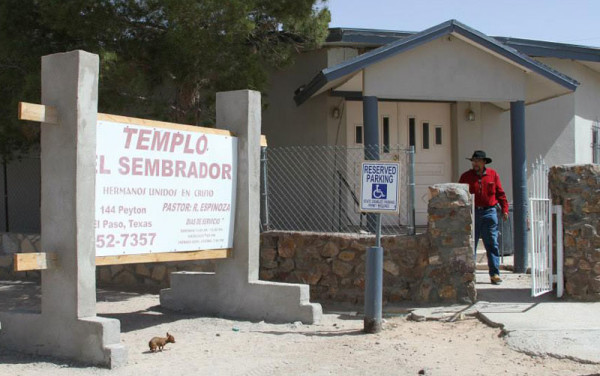
The El Sembrador church in El Paso.
Phil Whipple, Bishop
During June, Sandy and I visited the United Brethren churches in Texas and New Mexico. We traveled with Denis Casco, Bishop of Mexico Conference. It was through Denis that these churches landed in our fellowship.
You may be surprised to know that we have churches in those states, but we do—four churches in El Paso, Texas, and one in Santa Fe, New Mexico. All are Hispanic churches.
These churches became part of us during the 1990s. At the time, Denis served as Director of Latin American Ministries, working to start Hispanic churches in the United States. Denis, who is excellent at networking, came in contact with these churches and they chose to affiliate with us.
El Paso is on the tip of the far western arm of Texas. Across the Rio Grande River is Juarez, Mexico, which ranks among the most violent cities in the world. We have several churches in Juarez, but they are part of Mexico Conference.
We arrived on a Wednesday and attended a service at the El Sembrador church in El Paso. The pastor there is Robert Espinoza. Among the UB churches in El Paso, he would be considered the leader.
El Sembrador has its own building, which probably seats around 100. It was a pretty full house that night. One of Robert’s daughters led the worship band, and she was excellent. They had guitars, drums, and several vocalists, all fairly young.
They had invited all of the other pastors in both El Paso and Juarez—8 or 9 pastors in all. Robert introduced the various pastors, all of whom came forward to give a testimony. It was a long service, but fun and enjoyable.
Robert has two other children involved in the church. A daughter and her husband will probably be the next pastoral couple among the El Paso churches.
Juarez, Mexico
The next day we crossed into Mexico, along with a lay couple, and toured the UB churches in Juarez. The first church we visited had a woman pastor, whom I had met the night before; she joined us. Robert Espinoza and his wife, Maria, were also there. They traveled with us, in their own vehicle, the rest of the day.
We visited five churches and a preaching point, all United Brethren churches spread out in different parts of Juarez. The church with the newest building is probably a quarter mile from the Rio Grande; you can see El Paso on the other side. That church had started in a small building, no larger than a garage. Now that building is used for storage, and they meet in a newer building, probably 2-3 years old. It’s a wood-frame building, similar to a machine shed with wood siding (most buildings in Mexico use cement blocks). They’re still finishing the inside.
This congregation does a lot of ministry in feeding the many homeless people in that area. Helping these folks gives them a certain sense of protection; they won’t let anything happen to this church, because they get food from there. It’s not the safest location, but the UB members feel safe and have been safe.
We kept picking up the pastors as we went. By the time we reached the final church, our numbers had swelled to at least 20 persons. This was intentional on Denis Casco’s part. Knowing that Juarez was a dangerous city, he thought there would be security in numbers. I wasn’t alarmed by anything I saw in Juarez. However, we visited during the daytime and then returned to El Paso before dark.
Back in El Paso
I spoke at a UB church in El Paso that night. This congregation, much smaller than the night before, met in a strip mall storefront; they had relocated since Bishop Casco’s last visit. There were probably 25-30 people; I doubt the building could have handled more than 40.
Everyone there spoke English…except for the couple who had spent the day driving us around Juarez. For their sake, my message was translated by a young woman named Christina. She is married with three kids, though it looked to me like she could be in high school. This was the first time Christina had ever translated a sermon. She struggled to get into the rhythm of it, but whenever she stumbled over a word, the congregation would help her out, since they all understood English.
It was a good experience for Christina, because it kept her engaged with the message. Some deep work happened in a number of people that night, including Christina, who was in tears by the end of the message. I don’t know her story, but God moved in her life that night.
The pastor there is the brother of Robert Espinoza. He is getting up in years and health issues prevent him from doing much. For that reason another man, a sharp fellow in his mid 40s or 50s, is taking on the role. Though that man wouldn’t call himself the pastor, he does most of the preaching. Christina is his daughter.
Reinforcing the UB Bond
The Hispanic church world seems to place more emphasis on churches starting other churches: “We’re excited about what’s happening here, but we want to plant a church somewhere else, too.” They don’t need a lot of resources, as is usually the case with starting churches among suburban Anglo populations. Give them a speaker and a location, and if people start congregating, they’ll have a church. It’s ingrained in their thinking, part of the DNA of Hispanic ministries.
When the El Paso churches first affiliated with us, some financial support came from the national office. But then a shift occurred—that we would support them from a relationship and training standpoint, but not with finances. They bought into that. I got no sense that they were looking for any kind of financial support. Their interest is in the relationship with other United Brethren churches in the United States. However, I think they would love for us to provide some training for their pastors. We can probably do that.
There’s a good relationship between the churches in Juarez and El Paso, but the border does separate them. The churches in Juarez see themselves as part of Mexico Conference, while the churches in El Paso clearly see themselves as United States churches. That distinction matters to them. However, they are fine with Denis Casco working on both sides of the river.
I appreciate the way Bishop Casco has engaged with these churches during his periodic visits, reinforcing the US United Brethren connection even though he is the bishop in a whole different country. Denis waves the United Brethren banner wherever he goes. To him, being part of the United Brethren Church is more important than which national conference you belong to.
I went to El Paso and Santa Fe wanting to connect these churches with the national church in the US. In all the turmoil following our major restructuring in 2005 and the creation of Mexico Conference, these churches somewhat slid off of our radar. But thanks at least in part to the work of Denis Casco, I founded that being connected to the United Brethren Church is very important to these churches. I look forward to nourishing this relationship in the years ahead.
Tomorrow: Visiting the UB church in Santa Fe
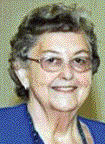 Eleanor Laughlin Morey (right), a former UB missionary to Sierra Leone, passed away on August 7, 2014, at her home in Mt. Morris, Mich. She was 80. Eleanor served three years as a teacher in Sierra Leone, 1968-1971. She and Kenneth Morey, who passed away in 2010, were married in 1978. She retired from Flint Community Schools, and remained active as a member of Richfield Road UB church (Flint, Mich.). Eleanor is survived by her four children.
Eleanor Laughlin Morey (right), a former UB missionary to Sierra Leone, passed away on August 7, 2014, at her home in Mt. Morris, Mich. She was 80. Eleanor served three years as a teacher in Sierra Leone, 1968-1971. She and Kenneth Morey, who passed away in 2010, were married in 1978. She retired from Flint Community Schools, and remained active as a member of Richfield Road UB church (Flint, Mich.). Eleanor is survived by her four children.




 John Pessima (right), Bishop, Sierra Leone Conference
John Pessima (right), Bishop, Sierra Leone Conference